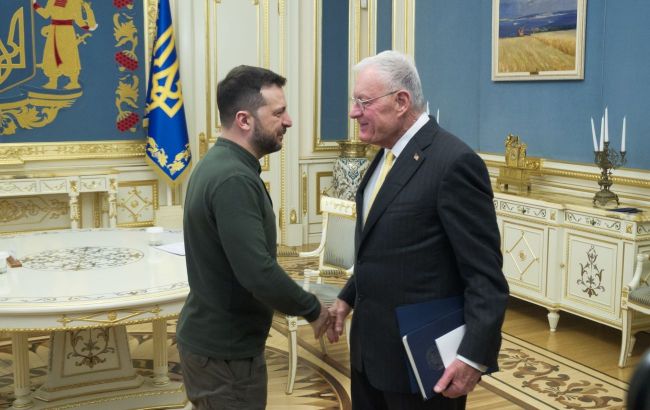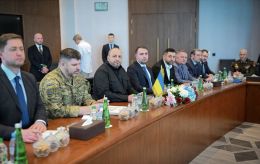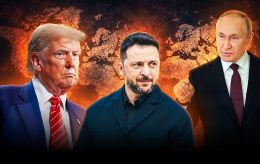Rockets instead of peace talks: Key moments this week
 Volodymyr Zelenskyy and Keith Kellogg (photo: Getty Images)
Volodymyr Zelenskyy and Keith Kellogg (photo: Getty Images)
This week, discussions on ending the Russia-Ukraine war took place mainly at a technical level, involving Ukraine, the US, and European countries. Meanwhile, Russia continued to refuse de-escalation, striking rear cities in Ukraine.
RBC-Ukraine outlines the main events in the negotiations and highlights some worrying trends.
Key questions:
- What did Zelenskyy and Kellogg discuss in Kyiv?
- How did the US and Europe react to attacks on Ukraine?
- What came out of the Ukrainian delegation’s visit to the US?
Dialogue continues amid escalation
On Ukraine’s Independence Day, August 24, US special envoy Kurt Kellogg arrived in Kyiv and held a series of meetings with Ukrainian leadership.
"We discussed how we can influence the Russians, force them into real negotiations and end the war. Sanctions, tariffs – everything must remain on the agenda," President Zelenskyy said after the meeting.
Presidential Office Head Andriy Yermak also spoke with US Secretary of State Marco Rubio and other American partners.
US Ambassador to NATO Matthew Whitaker noted that Trump has several tools to support a peaceful resolution of the war between Russia and Ukraine. According to the diplomat, the US is currently supplying weapons and ammunition to European NATO allies and Canada, who then pass them on to Ukraine, and this process "can be intensified."
In response, the Kremlin escalated the conflict. On the night of Thursday, August 28, Russia carried out a new large-scale strike on Ukraine, killing more than 20 people. Two missiles hit just 50 meters from the EU representation in Ukraine and the European Investment Bank. European Commission President Ursula von der Leyen announced preparations for a new 19th package of sanctions against Russia. The British Council building was also damaged.
This was the first major strike since the intensification of talks and the Trump-Putin meeting in Alaska.
"These today's Russian missiles and strike drones are a clear answer to everyone in the world who for weeks and months called for a ceasefire and for real diplomacy. Russia chooses ballistics, not the negotiation table," Zelenskyy said following the strike.
European leaders condemned the attack, but the US response was muted. US Special Presidential Envoy for Ukraine, Keith Kellogg, wrote on X that Russian attacks "threaten the peace the US president seeks." The US Embassy in Kyiv stated that strikes on civilian targets are unacceptable and must stop immediately.
White House spokesperson Caroline Levitt noted that the US president was displeased by the Russian strike on Kyiv, but it "did not surprise him." She also mentioned that while Russia attacked Kyiv, Ukraine struck Russian oil refineries.
"The President is continuing to watch this intently. This killing, unfortunately, will continue as long as the war continues, which is why the President wants it to end, and that's why he's worked harder than anyone to end this war," Levitt added.
Working on security guarantees
On August 28, President Zelenskyy said that advisors on national security are working on each component of Ukraine’s security guarantees. Two subgroups are involved: one political-legal and one purely military.
"Next week the entire configuration will be on paper," Zelenskyy said.
Earlier in the week, Trump vaguely stated that the US would provide significant support within the framework of security guarantees for Ukraine.
"Europe is going to give them significant security guarantees, and they should, because they're right there. But we'll be involved from the standpoint of backup to help them," Trump said on August 25.
As part of the preparation for security guarantees, a Ukrainian delegation visited Washington. It included Presidential Office Head Andriy Yermak, Prime Minister Yulia Svyrydenko, and Deputy Foreign Minister Serhiy Kyslytsya. Yermak and Kyslytsya met with Trump’s special envoy Stephen Witkoff.
"The key priority is to push forward real diplomacy and ensure the implementation of all the agreements reached at the Washington summit. We are coordinating our efforts," Yermak said.
Following the meeting, Yermak added that no one is pressuring Ukraine over its territory.
"I am satisfied with the meeting with Witkoff. It is very important to immediately stop all rumors – no one from the US side is pressuring Ukraine regarding any territories," Yermak said at an online briefing.
Ukrainian Foreign Minister Andrii Sybiha held talks with US Secretary of State Marco Rubio and foreign ministers from France, Finland, Germany, Italy, Poland, the UK, and EU foreign policy chief Kaja Kallas. Sybiha reiterated that security guarantees must be concrete, legally binding, and effective.
"They should be multidimensional, including military, diplomatic, legal, and other levels. We all share the conviction that the Ukrainian army is the fundamental level of any such guarantees, therefore its maximum strengthening is our top priority," the minister said.
In addition, Yermak and National Security Secretary Rustem Umerov visited Qatar. According to Yermak, they discussed shared security and defense interests and ways to further develop partnerships between the two countries.
"As for the negotiation process: our team is currently working along the Qatar – Saudi Arabia – Turkey – UAE – Switzerland – US line. That is, besides America, the Global South," Zelenskyy explained.
He added that positive results are being recorded, with the potential to use these countries as negotiation platforms.
"I will receive a full briefing on Saturday evening. Regarding these countries as potential platforms for future leader-level meetings in bilateral or trilateral formats," Zelenskyy said.
Overall, there are still no signs that Russia is genuinely ready to end the war or participate in a summit at the leader level. Nor is there evidence that the US is pushing Russia toward a meeting. At the same time, US rhetoric has again hinted that, in the negotiation deadlock, Ukraine may also bear some responsibility, though these statements so far come only from a White House spokesperson. This could potentially pose new risks for Ukraine.

